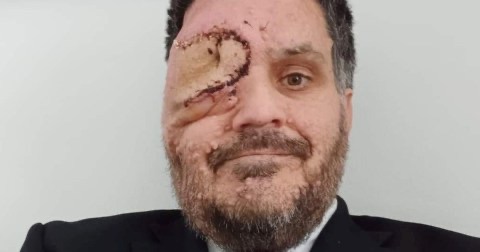A man with facial disfigurement claims he was asked to leave a restaurant because he was “scaring customers.”
Oliver Bromley, 42, was undergoing treatment at King’s College Hospital in Camberwell, southeast London, when he decided to stop by a nearby restaurant for lunch. However, when he approached the counter to order, a staff member informed him that other customers had complained about his appearance and asked him to leave.
Oliver has Neurofibromatosis Type 1, a genetic condition that causes benign tumors to develop on his nerves. Shocked and upset by the incident, he wrote to the restaurant but did not receive a reply.
Now, Oliver is sharing his experience to raise awareness about his condition and to help prevent similar situations for himself and others. He has connected with the charity Nerve Tumours UK, which noted that such experiences are regrettably “not uncommon.” The charity is coordinating discussions with UKHospitality to promote greater awareness within the hospitality industry.
While off work and helping to run an NHS mental health crisis helpline, Oliver decided to treat himself to lunch last month. “The food looked good when I saw it through the window, so I went inside,” he said. After realizing the restaurant was cash only, he withdrew some money and approached the counter to place his order.
“The gentleman behind the counter told me there had been complaints about me and asked me to leave. I asked him to repeat himself, and he said I was scaring customers.”
Living in Reigate, Surrey, Oliver was taken aback by the employee’s remarks, especially since he had barely been in the restaurant. “I hadn’t even sat down. I went to place my order, and they asked me to leave. Perhaps they saw me browsing; I don’t know, but that’s what they said. I was very upset and went to a local park to gather my thoughts.”
After writing to the unnamed restaurant without receiving a response, Oliver reported the incident to the Metropolitan Police, who recorded it as a hate crime. The police confirmed that they took the report seriously, although no arrests had been made.
Karen Cockburn, director of Nerve Tumours UK, expressed disappointment over Oliver’s experience, emphasizing the need for public education about the condition. “If Oliver felt discriminated against, he may have a case under the 2010 Equalities Act, which includes ‘severe disfigurement’ as a protected characteristic.”
The charity has reached out to the restaurant and UKHospitality, which has agreed to collaborate in raising awareness about the condition in the hospitality sector. Cockburn is set to meet with them soon to initiate this partnership.
